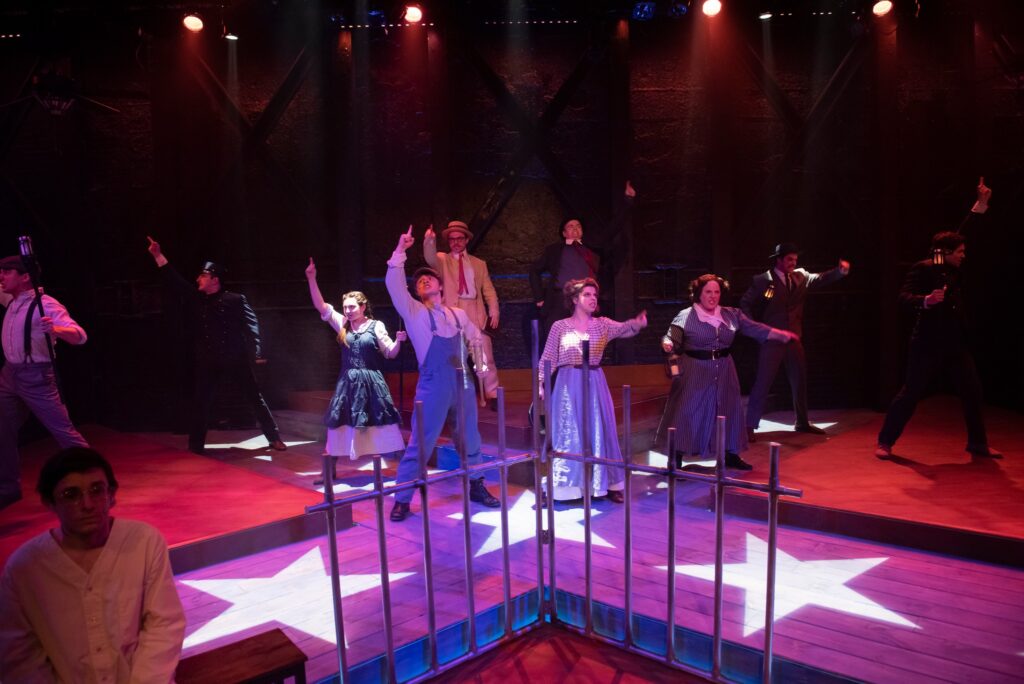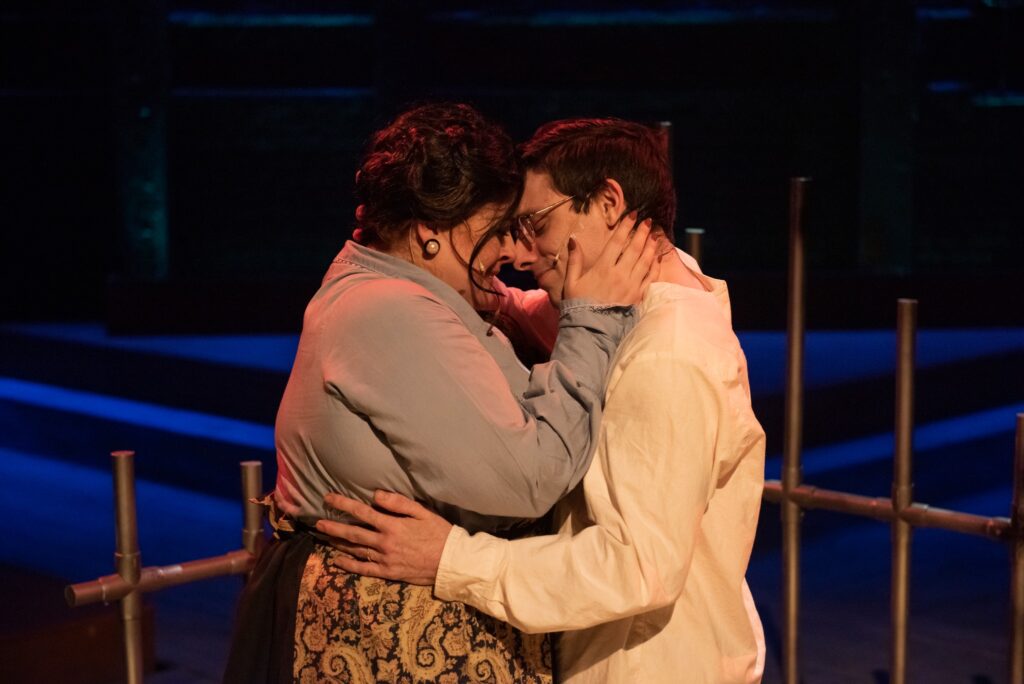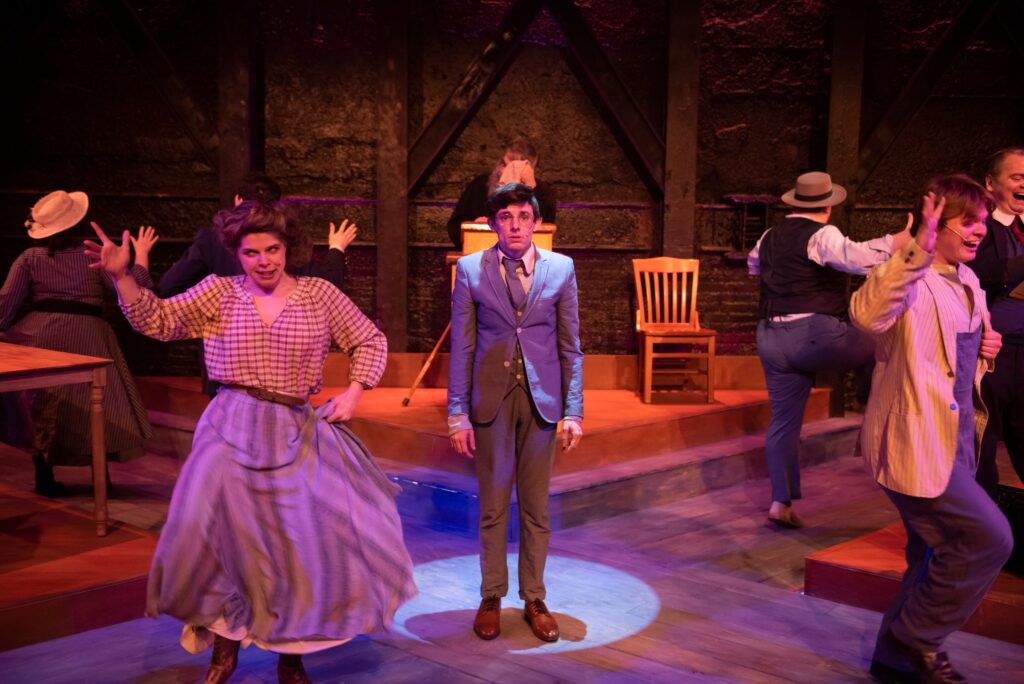
Music and lyrics by Jason Robert Brown. Book by Alfred Uhry. Directors Ben Hart and Brandon James. Music Director William Asher. Choreographers Jason Faria and Alyssa Dumas. Lighting Designer Zachary Ahmad-Kahloon. Sound Designer Andrew Cameron. Properties Designers Gretchen Gray and Elise Marshall. Costume Designer DW. Set Designers Ben Hart and Brandon James. Presented by the Seacoast Repertory Theatre, Portsmouth, NH through April 9th.
by Linda Chin
The notorious 1913 case of Leo Frank, a Jewish man from the north framed by anti-Semites in Georgia for the murder of his factory employee 13-year-old Mary Phagan, is chillingly dramatized in the musical Parade. With hate crimes intensifying in the US – and a recently released ADL (Anti-Defamation League) report showing that incidents of antisemitic activity in New England surged to historic levels in 2022 – this story is tragically timely and relevant.
Seacoast Rep’s PARADE taps into the human need to belong. Leo (fully embodied by Jason Faria) feels uncomfortable in the community where he works and lives, as he laments in the song, “How Can I Call This Home?”
[LEO]
It’s like a foreign land, I didn’t understand
That being Southern’s not just being in the South…
When I look out on all this, how can I call this home?
A Yankee with a college education, Who by his own design
is trapped inside the land that time forgot!
I’m trapped inside this life, and trapped beside a wife
Who would prefer that I said “Howdy”! Not “Shalom!”
Well, I’m sorry, Lucille, but I feel what I feel
And this place is surreal, so how can I call this home?
His wife Lucille (a mellifluous Jennifer Sue Rockwell) is also Jewish but identifies more strongly with her southern roots, a source of tension in their marriage. During the trial and imprisonment, Lucille remains resilient, resourceful, and steadfastly loyal (“You Don’t Know This Man” and “Do It Alone”), and Leo shows greater appreciation for his wife. They grow closer and their beautifully sung duets “This is Not Over Yet” and “All the Wasted Time” are heartbreaking.

Parade Directors Ben Hart and Brandon James demonstrate their cohesive vision and strong attention to detail. The duo also designed the simple and versatile unit set, which – supported by Zachary Ahmad-Kahloon’s spot-on lighting design – makes great use of the space for both the show’s intimate moments and full-company, full-stage production numbers. Jason Faria and Alyssa Dumas’ spirited choreography help the cast of triple-threats advance the storytelling with their every move.
Seacoast Repertory strives for bold programming and inclusive casting, and per usual the company of Parade includes talented stage veterans and aspiring actors. In “The Picture Show” 2023 Rep Company member Jacob Anspach (an earnest Frankie Epps) and teen apprentice Grace Dalton (a soulful Mary Phagan) flirt playfully, filling us with the anticipation of a budding romance. In contrast, the scene where a trio of Mary’s co-workers (expressive Heather Conti-Clark, Kallei Trottier, and Ozma Kasten) being seduced by factory supervisor Leo Frank (Faria transformed from gentle to lecherous) is “re-enacted” in the courtroom is one of the cringiest numbers in the production. At the top of Act II, the number “A Rumblin’ and a Rollin’” performed by African-American domestics Angela and Riley (the versatile Alexandra Mullaney and Craig Terrell play multiple roles) raises questions about the state of belonging in America.
[ANGELA]
Mister Frank, good for you. Lotta folks comin’ to get you through.
Mister Frank, ain’t that grand? Lotta folks comin’ to take a stand.
Mister Frank, knock on wood. It ain’t gonna do you no goddamn good!
[RILEY]
I can tell you this, as a matter of fact,
That the local hotels wouldn’t be so packed
If a little black girl had gotten attacked

Categorizing the characters in Parade as good and evil may seem straightforward, but from a psychological lens of belonging, it is less simple. When people feel socially connected and have agency belonging occurs. When people feel ignored, ostracized, or bullied (or ambivalent about being accepted or connected), feelings of non-belonging rise. In the world of Parade, and unfortunately the current climate in America, those in “power” tap into those who feel like outsiders and encourage them to join in. The power play is most effective when the feeling of belonging involves actively blaming and excluding others. Are the people who lied in their testimony evil? Or did they succumb to group pressure? Was Leo Frank the only person with the courage to march to a different drummer?
Seacoast’s pitch-perfect production of PARADE raises these complicated questions and thoughtfully depicts a tragic set of circumstances. Their biggest success, in my opinion, was demonstrating that – with the power of art and community – belonging can be cultivated. For tickets and information, go to: https://seacoastrep.org/

